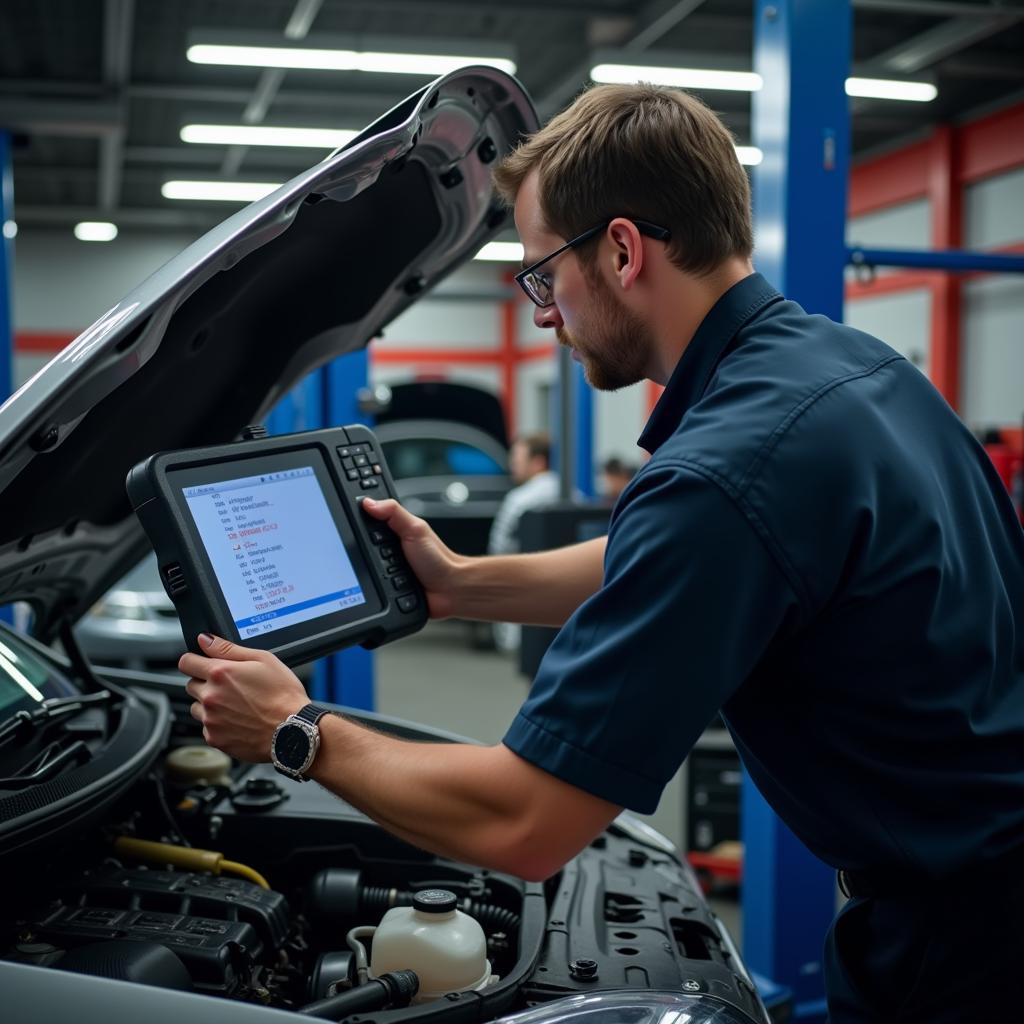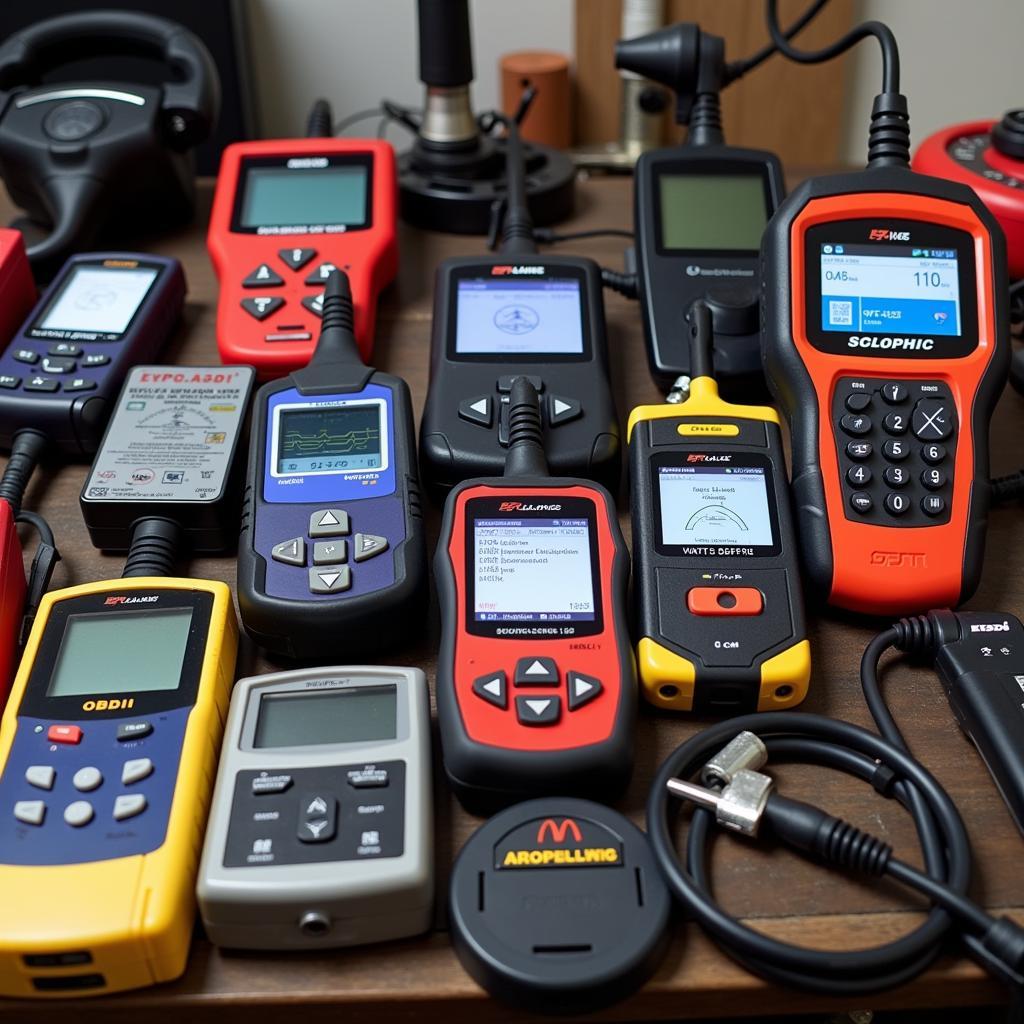For the everyday car owner, the sounds and lights that signal trouble under the hood can be a source of anxiety and frustration. What’s causing that strange noise? Why is the check engine light on…again? A Diagnostic Tool For Car maintenance acts like a window into your vehicle’s computer system, translating complex codes and data into understandable information. This information can empower you to pinpoint issues, potentially saving you time, money, and unnecessary trips to the mechanic.
Why are Diagnostic Tools for Cars Essential?
Remember the days when a mechanic would diagnose a car problem primarily by ear and experience? While those skills are still valuable, today’s vehicles are complex machines run by intricate computer systems. A diagnostic tool for car repair plugs into your vehicle’s OBD-II port (On-Board Diagnostics, usually located under the dashboard) and communicates with these systems, reading error codes, and displaying live data streams.
Here’s why they’re indispensable:
- Accurate Diagnosis: Gone are the days of guesswork. Diagnostic tools provide specific error codes that pinpoint the source of the problem.
- Early Detection: Often, car problems start small but worsen over time. Diagnostic tools can detect these minor issues early on, allowing for timely repairs and potentially preventing major (and expensive) damage.
- DIY Empowerment: For the mechanically inclined, a car diagnostic tool can be a powerful tool for DIY repairs, allowing you to diagnose and potentially fix certain problems yourself.
- Informed Decisions: Even if you’re not doing the repairs yourself, understanding the diagnostic information empowers you to make informed decisions about the repairs your car needs, discuss them confidently with your mechanic, and potentially avoid unnecessary services.
 Mechanic using a diagnostic tool on a car
Mechanic using a diagnostic tool on a car
Types of Diagnostic Tools for Car Owners
From basic code readers to advanced professional-grade scanners, the market offers a range of diagnostic tools to suit different needs and budgets:
- Code Readers: As the name suggests, these tools primarily read and clear basic error codes. They’re budget-friendly and great for DIY enthusiasts who want to understand and address simple issues.
- OBD-II Scanners: Offering a step up from code readers, these tools provide more detailed information, including live data streams, sensor readings, and the ability to graph data over time.
- Professional-Grade Scanners: These are the tools of choice for professional mechanics. They offer comprehensive functionality, advanced features for specific car makes and models, and often come with software for in-depth analysis.
Choosing the Right Diagnostic Tool for Your Car
With so many options available, selecting the right diagnostic tool can seem daunting. Consider these factors:
- Your Budget: Set a realistic budget range, keeping in mind that more advanced features come at a higher price point.
- Your Skill Level: If you’re a DIY beginner, a basic code reader or an easy-to-use OBD-II scanner might suffice. More experienced users might benefit from the advanced features of a higher-end model.
- Your Car’s Make and Model: Some diagnostic tools are designed for specific car makes or models, offering specialized functions and access to manufacturer-specific codes.
 Various car diagnostic tools displayed on a workbench
Various car diagnostic tools displayed on a workbench
Beyond Codes: Unlocking the Power of Data
While retrieving and understanding error codes is essential, the real power of a diagnostic tool lies in its ability to provide access to live data streams. Imagine being able to monitor your engine’s performance in real-time, track fuel efficiency, or analyze emissions data – all from the palm of your hand.
Modern diagnostic tools, particularly those with mobile app integration, offer these capabilities and more. They provide valuable insights into your vehicle’s health, performance, and potential issues, empowering you to make informed decisions about maintenance and repairs.
The Future of Car Diagnostics
The automotive industry is in a constant state of evolution, with technology driving innovation at a rapid pace. Diagnostic tools are no exception. As vehicles become increasingly sophisticated, so too will the tools designed to understand and interact with them.
We can expect to see:
- Increased Integration: Seamless integration with smartphones and cloud-based platforms will allow for remote diagnostics, data sharing with mechanics, and even predictive maintenance alerts.
- Augmented Reality (AR): Imagine using your smartphone or tablet to overlay diagnostic information onto a live view of your engine bay, making it easier than ever to identify components and potential issues.
- Artificial Intelligence (AI): AI-powered diagnostic tools will leverage vast databases of vehicle data to provide increasingly accurate diagnoses, predict potential failures, and even suggest personalized maintenance schedules.
Conclusion
A diagnostic tool for car maintenance is no longer a luxury reserved for professional mechanics. It’s an essential tool for any car owner who wants to understand, maintain, and potentially repair their vehicle. As technology advances, these tools will only become more powerful, user-friendly, and integral to the automotive ownership experience. Investing in a quality diagnostic tool is an investment in your car’s health, your peace of mind, and potentially, your wallet.
Need help choosing the right diagnostic tool? Contact us via WhatsApp: +1(641)206-8880 or Email: [email protected]. Our 24/7 customer support team is ready to assist you.

Leave a Reply